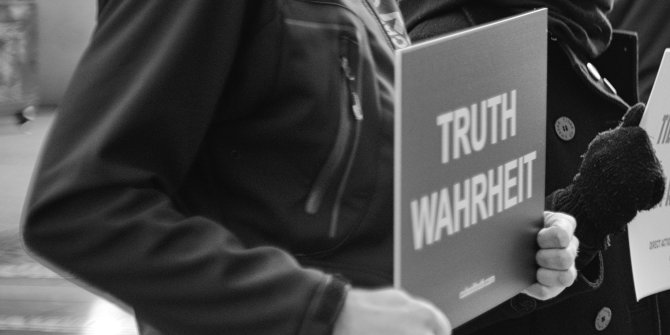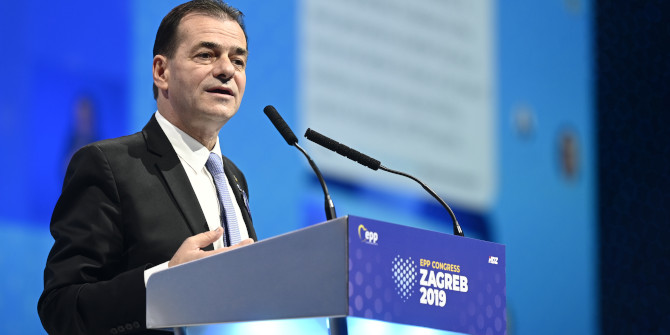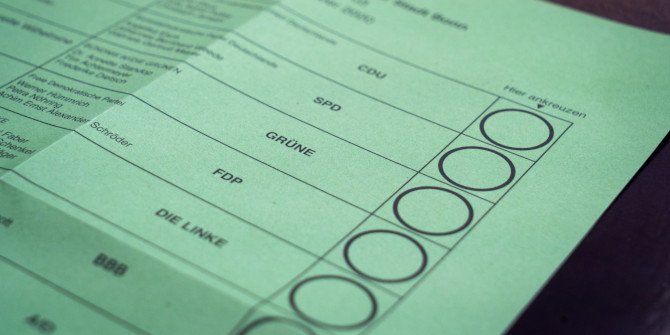 ‘Populism’ and ‘liberalism’ are often viewed as being in opposition to one another, but many ‘populist’ parties nevertheless cite liberal values in making their case for particular policies, such as a reduction in immigration. Ben Margulies assesses the case of Geert Wilders’ Party for Freedom and its approach to the six Caribbean islands that form part of the Kingdom of the Netherlands. He argues that the case illustrates how populist parties can use liberal values instrumentally to push for favoured policies, even when there is no apparent clash between a liberal ‘in’ group and an illiberal ‘out’ group.
‘Populism’ and ‘liberalism’ are often viewed as being in opposition to one another, but many ‘populist’ parties nevertheless cite liberal values in making their case for particular policies, such as a reduction in immigration. Ben Margulies assesses the case of Geert Wilders’ Party for Freedom and its approach to the six Caribbean islands that form part of the Kingdom of the Netherlands. He argues that the case illustrates how populist parties can use liberal values instrumentally to push for favoured policies, even when there is no apparent clash between a liberal ‘in’ group and an illiberal ‘out’ group.

Willemstad, the capital of Curaçao, Credit: Tom Roeleveld (CC BY-NC 2.0)
Many scholars, essayists and journalists treat “liberalism” and “populism” as antagonistic concepts. One proclaims the importance of checks and balances, the rule of law, minority rights and pluralism; the other casts them all aside in the name of the singular, unified and absolutely sovereign “will of the people.”
However, the two spheres are not as easily distinguished in practice as they are in theory. Many populist parties in Western Europe claim to be defending at least some liberal values. Even radical-right populist parties, which Cas Mudde defines as “authoritarian, nativist and xenophobic,” will sometimes claim to defend values like secularism, feminism or minority rights. They may adopt a “civic,” values-based definition of the nation rather than a cultural, genetic or ethnic one. In part, this is because democracy, and certain rules relating to democracy are generally accepted in Western Europe.
Another key reason why radical-right populists embrace liberalism and secularism is to reconfigure and restate one of the main policy concerns, which is the exclusion of immigrants. The argument is that we (Dutch, Danes, French, or sometimes all Westerners) respect laws and individuals and women; they (almost always Muslims) do not. Rogers Brubaker recently published an article on this subject. This poses a question. Do radical-right parties have genuine commitments to the liberal values they espouse, as Takis Pappas argues? Or is this liberalism merely a tool towards a xenophobic, Islamophobic end, as Brubaker’s piece seems to contend? Is it merely an “instrumental liberalism”?
One way of examining this question is to look at whether and how radical-right populists discuss liberal values, themes and commitments when they aren’t talking about Muslims. In my work, I decided to look at how a radical-right populist party dealt with a minority that is a) legally indistinguishable from the majority and b) has little direct relationship to Muslim minorities, or to discourse about Islam. The radical-right populist party in question is the Partij voor der Vryjheid (Party for Freedom, PVV). The PVV has long portrayed itself as a defender of Dutch civic values and tolerance against the Muslim threat. The minority is the Antilleans, people who come from, or whose immediate ancestors came from, the six Caribbean islands that form part of the Kingdom of the Netherlands.
The Antillean case is illustrative for two main reasons. Firstly, the people of the Antilles have been Dutch citizens since the end of slavery in 1863. In 1954, a special charter created “The Kingdom of the Netherlands,” in which the three largest islands now form equal parts of an overarching legal structure with the metropolitan Netherlands. Like Puerto Ricans in the United States or Martinicans in France, Antilleans are legally indistinguishable from other Dutch citizens, About 135,000 Antilleans, including second- and third-generation descendants, lived in the Netherlands in the first decade of this century.
Secondly, it is much harder to claim that Antilleans are culturally alien. The Dutch have ruled these islands since the 17th century. Many Antilleans speak Dutch, though the islands’ main languages are Papiamentu (a creole language) and English. The Antilles are predominantly Christian societies. All of them have democratic governments, and the same legal system as the Netherlands. If the PVV advances a civic nationalism, and if its main concern about migrants is a clash between liberal and illiberal values, then the Antilleans should pose no problem.
I conducted a content analysis of 74 statements on the Antilles, dating from between 2007 and 2016, culled from the PVV website. I used the PVV website search engine to collect documents relating to the islands, using four keywords: “Antillen,” “Curaçao,” “Aruba” and “Sint Maarten,” referring to the Antilles generally and to the three largest islands. I used Google Translate to produce a serviceable English rendering of the documents, split them into approximately 470 smaller units of text for convenience, and then analysed them using a simple set of codes, which were refined during the analysis process into a codebook of 17 codes and two sub-codes.
What I found was that the PVV’s belief in civic nationalism didn’t extend to their Antillean compatriots. Indeed, the most striking reference to liberal values in the PVV’s discussion of Antilleans was almost nakedly “instrumental,” if not cynical, mirroring the way the party speaks of Muslims. I made three main findings:
- Neoliberal populism/welfare chauvinism: No topic appeared more often in the 74 PVV documents than the costs the islands imposed upon the Dutch taxpayers. Nearly three-fifths of the documents contained some reference to the costs of the Caribbean islands. This is often tied to complaints about how the money could be better spent on welfare services in the Netherlands. These sorts of objections can reflect a neoliberal hostility to welfare spending; alternatively, they can express a sentiment that welfare is being wasted on the wrong people. For example, in a 2008 speech, PVV deputy Hero Brinkman lamented that “Dutch elderly people struggle with diaper days and malnutrition” while the Antilles received “expensive tax money from the hard-working Dutch citizen.” Both neoliberal and welfare-chauvinist discourses are often entangled in racial politics. In the US, voters who reject welfare spending often assume such spending is going to non-white voters; in Canada and Australia, welfare spending is associated with indigenous groups.
- Essentialism: Calling yourself a liberal is no guarantee against harbouring prejudiced opinions. However, some authors point out there is a difference between the ways liberals and conservatives talk about outgroups. When talking about Muslims, conservatives or illiberal actors will tend to assume that Muslims are individually indistinguishable and threatening. Liberals will tend to say that Islam may be a hostile ideology, but will resist accusing all Muslims of being universally hostile to the West. Dutch discourse about the Antilleans follows the same pattern. The PVV isn’t the only actor in Dutch politics which expresses these views, and indeed a mainstream liberal politician proposed imposing immigration controls on Antilleans. But mainstream politicians don’t speak of all Antilleans, but instead “disadvantaged” (kansarme) Antilleans who come from poor backgrounds and cannot integrate. The PVV, on the other hand, never distinguishes between individual Antilleans or uses the term “disadvantaged” Antilleans.” The only individual Antilleans the party’s leaders mention are political figures it deems corrupt or objectionable. Instead, there is a constant flow of accusations of corruption (in 61 units), criminality (43 units), and occasional remarks that could be interpreted as flat-out racist (referring to the islands as a “great jungle” or their leaders as a piña colada mafia”).
- Instrumental liberalism: The PVV, like many radical-right populist parties, draws a distinction between a liberal “us” and a not liberal “them.” If we accept Brubaker’s interpretation, this commitment to liberalism is less about devotion to the Enlightenment and more about Islamophobia. The references to liberal values are thus (in my usage), “instrumental.” What is interesting is that the PVV also makes an “instrumental” use of liberal values when discussing the Antilleans, a mainly Christian population of Dutch citizens living in a democratic state. In 19 of the 74 documents, the PVV calls for unilaterally expelling the Dutch Caribbean from the Kingdom of the Netherlands. At times, this is justified on cost grounds. But the party also claims that the Dutch are being denied their right of self-determination because they are not allowed to rid themselves of the Antilles. The PVV claims that the Dutch are unfairly fettered to the Antilles by Article 73 of the United Nations Charter. As a result, according to PVV deputy Sietse Fritsma, “The opinion of the Netherlands, the Dutch citizen, the Dutch taxpayer does not matter. It is completely irrelevant and inferior to the opinion of the inhabitants of the Antilles.” Thus, the liberal principle of national self-determination is used to justify freeing an oppressed metropole from its own former colonies (and a white people are oppressed by a primarily non-white minority).
This study is not a fully developed cross-national examination of radical-right populist attitudes towards liberalism. Right-populist attitudes towards non-immigrant minorities vary; for example, while there is racial resentment towards indigenous populations in Australian radical-right discourse, this does not seem to be a major issue in New Zealand. Instead, this study suggests one method for interrogating the radical-right populist relation with and commitment to liberalism. Are these parties liberal when the rest of the world isn’t paying such close attention? And how do they use liberalism in these secondary policy areas? For the PVV, the answers seem to be “no,” and “cynically.”
Please read our comments policy before commenting.
Note: This article gives the views of the author, and not the position of EUROPP – European Politics and Policy, nor of the London School of Economics.
_________________________________
About the author
 Ben Margulies – University of Warwick
Ben Margulies – University of Warwick
Ben Margulies is a Postdoctoral Fellow at the University of Warwick.





